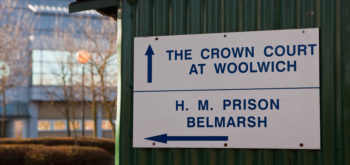Four criminal justice watchdogs have united to express ‘grave concerns’ about the long-term impact of the pandemic on backlogs in the courts as the latest figures revealed more than 53,000 cases waiting to come before Crown Courts. In a joint report, the Chief Inspectors – constabulary, probation, prisons and Crown Prosecution Service – flag up lengthy waits at all stages of the criminal justice process that ‘benefit no one and risk damage to many’.
According to the report, the number of ongoing cases in Crown Courts was 44% higher in December 2020 compared to February of the same year. Cases have now been scheduled for 2022. ‘Delays mean victims must wait longer for cases to be heard; some will withdraw support for prosecutions because they have lost faith in the process,’ said chief inspector of probation Justin Russell. ‘Witnesses will find it difficult to recall events that took place many months ago, and prosecutors waste significant periods of time preparing for cases that do not go ahead. Those accused of crimes face delays in their opportunities to defend themselves and seek acquittal. Defendants are kept on remand for longer periods, and prisoners continue to experience a highly restrictive prison regime or experience delays in accessing rehabilitation programmes and support through probation services.’
Russell said that court backlogs had ‘a ripple effect’ across all criminal justice agencies. ‘This is a whole-system problem that requires a whole-system solution,’ he added.
According to the report the government’s early-release schemes introduced in April 2020 to reduce the prison population, had ‘very limited effect’ with only 316 prisoners being released ‘despite many more prisoners being assessed as suitable. The schemes were paused in August 2020. The total prison population fell slightly by 4.5% (82,990 to 79,235) this was explained by the fall in court cases reducing the need for receptions to prison. However the remand population increased by 22% (from 10,043 to 12,274) to the highest figure in six years, representing 15.5% of the prison population.
As at 13 December 2020, the CPS’s post-charge caseload was 67% higher than pre-Covid which equated to 67,679 extra cases and took the total to 169,419. Magistrates’ court live caseload was 83% higher and Crown Court live caseload was 44% higher with 27,700 estimated to be trials, a 65% increase since February 2020. The inspectorates reported it was ‘not unusual to find trials being listed into 2022’ as the backlog grew.
The Inspectorate of Constabulary and Fire & Rescue Services cited ‘numerous examples of serious cases’ that had been cancelled at short notice, despite the offences having taken place a long time before. ‘Police officers and staff at all levels expressed significant concerns about the backlog of cases and its impact on victims and witnesses,’ the report stated. ‘Apart from affecting the confidence of victims in the CJS, it is likely that some victims will become unwilling to support prosecutions because of the delays.’
‘These unprecedented and very serious court backlogs constitute the greatest risk to criminal justice and the ripple effects across all agencies are profound. Agencies – and the committed individuals working in them – will do all they can to cope, but we have grave concerns that this will be at much personal and organisational cost. The problem is a whole- system one, not only a court one. It is the responsibility of government to respond on a whole-system basis.’
Joint inspectorate report
A recent survey by the London Criminal Court Solicitors Association revealed a four year wait for some parties in serious cases.On defence lawyer highlighted a serious sexual offence alleged in January 2018 involving ‘if true, a traumatised teenage victim’ and his client, ‘a teenager of prior good character’. The court case only began in February 2020 with the Trial set for this month but court has pushed it back to February 2022. ‘This implies that things are so bad this case was a lower priority,’ said the lawyer. ‘Issues in the case are of consent, that will require an examination of the small details of their interactions prior to and during acts. All will have to give this evidence four years after the event. They cannot put it out of their minds while they wait.’
Another case involved an alleged five-person affray in south London captured on CCTV in September 2017. Charges were authorised in April 2020 when his lawyers unsuccessfully argued that the trial be discontinued because of delay. There is still not trial date and, the lawyer noted, ‘we may well yet reach a full four years between incident and disposal’.







